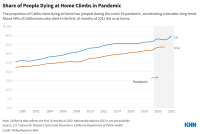Latest KFF Health News Stories
Una decisión difícil: cuando los adultos mayores tienen que dejar de conducir
Los riesgos para los conductores mayores aumentan con la edad y el desarrollo de afecciones como la artritis, el glaucoma y el Parkinson. Y cuando ocurren accidentes, son más propensos a sufrir heridas graves o morir porque son físicamente más vulnerables.
Preparing to Hang Up the Car Keys as We Age
As cognitive skills erode with age, driving skills weaken, but an aging driver may not recognize that. Advance directives on driving are one way to handle this challenge.
A Guide to Long-Term Care Insurance
Deciding when, or whether, to buy long-term care insurance can be complex. Here’s what to know.
Doubts Abound About a New Alzheimer’s Blood Test
Quest Diagnostics is selling a blood test online to consumers. But results may not be reliable or easy to interpret. And it isn’t covered by insurance.
New Alzheimer’s Drug Raises Hopes — Along With Questions
Clinics serving Alzheimer’s patients are working out the details of who will get treated with the new drug Leqembi. It won’t be for everyone with memory-loss symptoms.
The Real Costs of the New Alzheimer’s Drug, Most of Which Will Fall to Taxpayers
The annual cost of lecanemab treatment quadruples if the expense of brain scans to monitor for bleeds and other associated care is factored in. The full financial toll likely puts it beyond reach for low-income seniors at risk of Alzheimer’s, experts say.
Why the Next Big Hope for Alzheimer’s Might Not Help Most Black Patients
Black patients and other minorities tend to be diagnosed at later stages of the disease, which would exclude them from use of Leqembi. Few Black people were included in the main trial of the drug.
Dementia Care Programs Help, If Caregivers Can Find Them
Programs assisting people with dementia — and their caregivers — improve quality of life and care. But millions of unpaid family and friend caregivers may not know where or how to find help.
More Californians Are Dying at Home. Another Covid ‘New Normal’?
The proportion of Californians dying at home, rather than in a hospital or nursing home, accelerated during the pandemic, a trend that has outlasted the rigid lockdowns linked to the initial shift.
Ending Involuntary Commitments Would Shift Burden of Dementia Care to Strapped Communities
Health department officials anticipate having to transfer two dozen patients from the Montana State Hospital to another state-run facility if a bill to end involuntary commitments passes.
KFF Health News' 'What the Health?': GOP House Opens With Abortion Agenda
Leaders of the new Republican-led U.S. House kicked off their legislative agenda with two bills supported by anti-abortion groups. While neither is likely to become law, the move demonstrates how abortion will continue to be an issue in Washington. Meanwhile, as open enrollment for the Affordable Care Act nears its end in most states, the number of Americans covered by the plans hits a new high. Margot Sanger-Katz of The New York Times, Alice Miranda Ollstein of Politico, and Sarah Karlin-Smith of the Pink Sheet join KHN’s Julie Rovner to discuss these topics and more. Plus, for extra credit, the panelists recommend their favorite health policy stories of the week they think you should read, too.
Family Caregivers Find Support on #dementia TikTok
The TikTok hashtag “dementia” has billions of views. Caregivers of people with Alzheimer’s and other dementias have been using the site to swap tips and share the burdens of life with dementia.
KHN’s ‘What the Health?’: Leaked Abortion Opinion Rocks Washington’s World
The unprecedented early leak of a Supreme Court draft opinion that would overturn the landmark abortion-rights ruling Roe v. Wade has heated the national abortion debate to boiling. Meanwhile, the FDA, after years of consideration, moves to ban menthol flavors in cigarettes and cigars. Joanne Kenen of the Johns Hopkins Bloomberg School of Public Health and Politico, Shefali Luthra of the 19th, and Jessie Hellmann of CQ Roll Call join KHN’s Julie Rovner to discuss these issues and more. Plus, Rovner interviews KHN’s Paula Andalo, who wrote the latest KHN-NPR “Bill of the Month” episode about a family whose medical debt drove them to seek care south of the border.
Patients Divided Over Alzheimer’s Drug: Is It a ‘Risk I’m Willing to Take’ or Just a ‘Magic Pill’?
Medicare has proposed limiting coverage of Aduhelm, the costly new drug to treat Alzheimer’s disease, and several prominent groups representing patients and their families are pressing the program to make it more widely available. But among individuals facing the disease, the outlook is more nuanced.
Watch: Seniors Share How They’ve Made It Through the Pandemic
Nine seniors from across the country talk frankly about feeling alone and constrained, missing church, and family routines. They also share newfound hope and discoveries that arose from the crisis.
Inside the Tactical Tug of War Over the Controversial Alzheimer’s Drug
An epic battle is playing out behind the scenes over whether the government should pay for Aduhelm, an FDA-approved Alzheimer’s drug that scientists say has not been proven to work.
KHN’s ‘What the Health?’: Dealing With Drug Prices
Medicare officials tentatively plan to restrict the use of a controversial Alzheimer’s drug to only those patients participating in clinical trials, while the Department of Health and Human Services looks into lowering the monthly Medicare Part B premium. Meanwhile, covid confusion still reigns, as the Biden administration moves, belatedly, to make more masks and tests available. Joanne Kenen of Politico and the Johns Hopkins Bloomberg School of Public Health, Sarah Karlin-Smith of the Pink Sheet and Rachel Cohrs of Stat join KHN’s Julie Rovner to discuss these issues and more.
KHN’s ‘What the Health?’: Manchin Blows Up Biden’s ‘Build Back Better’
Sen. Joe Manchin (D-W.Va.) dealt a blow to congressional efforts to pass President Joe Biden’s domestic agenda bill, forcing Democrats to regroup starting in 2022. Meanwhile, the omicron covid variant spreads rapidly in the U.S., threatening the stability of the nation’s health care system. Joanne Kenen of Politico and the Johns Hopkins School of Public Health, Rachel Cohrs of Stat and Sarah Karlin-Smith of the Pink Sheet join KHN’s Julie Rovner to discuss these issues and more, plus a look back at the year in health policy. Also this week, Rovner interviews Ceci Connolly, president and CEO of the Alliance of Community Health Plans.
Alzheimer’s Drug Targets People With Mild Cognitive Impairment. What Does That Mean?
The condition can be an early signal of Alzheimer’s disease, but not always. Other health concerns could be causing thinking or memory problems, and the new drug, Aduhelm, would not be appropriate for those patients.
Minister for Seniors at Famed Church Confronts Ageism and the Shame It Brings
Lynn Casteel Harper, a minister at the interdenominational Riverside Church in New York City, discusses the spiritual dimension of aging.























